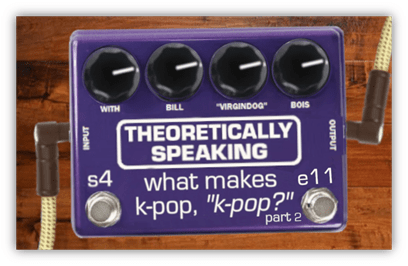As we saw with city pop,a nation’s economy has a lot to do with a musical genre’s success.
City pop was about Japan’s shining cities in the 1980s, and it came to an end with the economic collapse of the 90s.
A similar phenomenon happened, and is still happening, in Korea.

The economy there affects K-pop as well as the relationships between generations.
Let’s dig in, Gangnam style.
Following the Korean War, Korea had a baby boom similar to the west’s.
The country had to rebuild its infrastructure and businesses, and anyone who wanted a job could easily find one. As the decades rolled on, a college degree in any field guaranteed a position in that field.

Baby boomers, born after the war, knew only prosperity and put pressure on their kids to do well in school to get the best jobs possible. Millennials felt that pressure and worked hard, but….
The same financial crisis that hit Japan in the 90s hit Korea. The value of the hwan dropped by 50% and companies weren’t hiring. That college diploma wasn’t a golden ticket anymore.
The economy recovered soon enough but not for everyone, especially young people. The unemployment rate for those under 25 hovered around 10% for the few years prior to the pandemic, while housing costs skyrocketed.
Young South Koreans can’t afford kids, so the country has the lowest birth rate in the world.

It’s fallen from 1.5 children per woman in 1997 at the start of the financial crisis to 0.88 in 2023.
TThe marriage rate is down. The divorce rate is up. Meanwhile, the number of suicides continues to drop all over the world – but nearly doubled in Korea over the last 20 years.
A 2019 survey of people under 30 showed that 74% didn’t believe the phrase, “Hard work pays off.” They feel betrayed. They often live with their parents, but their parents think the kids just aren’t trying hard enough. That adds family stress on top of financial stress..
They’re called the n-po generation.
“Po” is short for “pogi,” which means “given up.” Initially, it was the 3-po generation, because they had given up on three things: dating, marrying, and having children.

Then they gave up on employment and housing, and became the 5-po generation, followed by the 7-po, 9-po, and 10-po generations as they gave up on human relationships, hope for their futures, health, appearance, and life itself
It’s now been updated to n-po, where n is an undefined number. They’ve given up on as many things as you care to name.
This makes Korea sound like a terrible place.
It’s not.

The economy has run roughshod over people’s lives, but those people are wonderful.
They’re as kind and warm and welcoming as people anywhere else.
That’s the backdrop for K-pop’s rise. From Seo Taiji and Boys’ songs about the harsh educational system and government corruption to BTS becoming the biggest band in the world with songs about stress and mental health, K-pop is entertainment – with the occasional supportive message.
Musically, K-pop combines pop melodies over simple chord structures and strong beats with American hip hop raps. There are often a few English phrases here and there.

Not to say all K-pop is formulaic, but there’s a definite calculus used to piece together a K-pop song, just like there’s a concept for putting together a K-pop act.
Once entertainment companies realized there was money to be made marketing music to teenagers, they set up idol training systems modeled after the ones in Japan.
It’s a rigorous, and some say abusive, routine of 12-or-more-hour days learning to dance, sing, rap, act, diet, and sometimes study regular middle and high school subjects.
The diet part is important. Trainees are often underfed while exercising relentlessly. At least one entertainment company weighs their trainees, boys and girls alike, in the same room and announces the results. Plastic surgery to create the classic K-pop look of pointed noses and sharp jawlines isn’t unheard of.
Trainees have limited contact with their parents or the outside world.

They live in private dormitories for which they’ll reimburse the companies out of any profit they see after they debut.
In K-pop, “debut” means to move from training to a career. If a trainee doesn’t debut, because they quit or just don’t make the cut, they still owe the company for those living expenses.
The South Korean government is currently considering a law colloquially known as the Lee Seung-Gi Crisis Prevention Act.

Lee is a popular actor in his 30s but went through the Hook Entertainment training system and debuted as a singer at 17.
He has sued Hook claiming they underpaid him for 18 years and for other sketchy financial shenanigans.
If instituted, the act will enforce fair payment of trainees, reduce the number of hours they can work per day, ban underaged trainees from dropping out of school, and stop painful techniques for honing physical appearance.
Out of all the kids who audition, only 1% make it into training. Of those, 0.1% will debut.
That means only 1 out of 100,000 auditioners will record a song.
So, you’re asking, why do kids want to go through that training?
And why would parents allow it?

They may see it as a way to become rich and famous, while others may view it as a way to learn skills and fortitude.
Also, parents may think of it as a way to provide a better life for their child and their family, even though they know it’s a long shot.
Some entertainment companies have better reputations than others, and K-pop fans are invested enough to know which company idols trained with.

If an idol makes it through the training at SM Entertainment or DSP Entertainment, they’re going to be good.
Entertainment companies decide whether a trainee should be a solo act or part of a group. When they put groups together, they want at least one good lead singer. K-pop, remember, comes from Seo Taiji and Boys’ take on American hip hop, so having a good rapper is also crucial.
It’s also important that at least one member of the group speaks English to make overseas marketing easier. Spanish helps sales in South America.
The entertainment companies are, obviously, rivals. They’re businesses, and they follow trends.

After DSP debuted a group called Idol in 1996, SM put out a similar group called H.O.T. that same year.
Then SM debuted a girl group called S.E.S., so DSP debuted a girl group called Fin.K.L.
It’s very much like hair care companies all deciding to put out Lilac Breeze fragrance shampoos within months of each other.
Which makes BTS all the more interesting.
They came from the much smaller Big Hit Entertainment, now known as the Hybe Corporation, started by Bang Si-hyuk. He was called “Hitman” because, while working at JYP Entertainment, he wrote or produced hits for Wonder Girls, Teen Top, 2AM, and more. He wrote g.o.d.’s “One Candle” which was in Part 1’s Suggested Listening.
Bang left JYP in 2005 to start his own company. He debuted a few pop acts and wanted to add a hip hop group.

He had an idea to set up a group around Kim Nam-joon, a teenager who would become known as RM, short for “Rap Monster.”
He found six other teens, some good at rapping, some at singing, and some at dancing, and they trained on all those things.They got very, very good.
Their dance moves are fast and sharp and precise. Sometimes they use the Michael Jackson technique of quickly moving to a position, freezing in it for a millisecond, and then moving to the next one.

All seven of them do it simultaneously.
BTS, which stands for “Bangtan Sonyeondan” and translates to “Bulletproof Boy Scouts,” works very hard. Over their ten years together, they’ve taken only two breaks. At first, they were only moderately successful, but they keep getting bigger. Every release outperforms the previous one.
The video for their 2021 song “Butter” received 10 million YouTube views in its first 13 minutes online. It set a record on Spotify by getting 11 million streams in its first 24 hours.
The song that held these records previously?

Their own song:
“Dynamite.”
What’s most different about them is they’ve gotten good at writing their own songs. “Hitman” Bang was a successful songwriter so he could have written all their material, but he recognized the band’s talents and their connection to fans. As time went on, the band wrote more and more of its music.
Even their early material dealt with more than romance.
2013’s “Nope” was a commentary on Korea’s harsh educational system. They did a three album series under the title, “Love Yourself,” something a lot of young Koreans, and the rest of us, needed to hear.
Their success at reaching people with messages of compassion and support earned them two invitations to speak at the United Nations.

RM spoke for all of them, first about self-love and rejecting violence, and the second time about perseverance and hope.
These are messages the world needs.
Young people in particular want to hear unironic takes on what it means to be good global citizens, and good local citizens, and to learn how to speak out against corruption, inequality, and oppression.
BTS, with their dyed hair and dangly earrings, help redefine ideas about masculinity without setting out to do so.

But when asked, RM called it an “outdated concept.”
“We live in an age where we shouldn’t have those labels or have those restrictions,” he told Rolling Stone.
The message is, of course, “Love Yourself” however you are. After all, as they say in “Boyz With Fun,” “You can’t go to the peak by being normal, baby.”
Part of accepting yourself as you are is accepting others as they are.
Both are signs of strength.

When racists started the Twitter hashtag #whitelivesmatter in an attempt to mock the Black Lives Matter movement, K-pop fans started added it to they tweets about their favorite bands.
That drowned out the hateful messages in a sea of Korean videos and pictures.

Likewise, Donald Trump’s team boasted that a million people tried getting tickets to his event in Oklahoma City.
Only 6,200 people showed up, leaving 12,800 empty seats in the arena.
K-pop fans stood up against his racism, too, by using fake names to order tickets for an event they had no intent of attending.

Attention bigots: Do not anger K-pop fans. They know how to stand up for themselves and others.
I’ve left out all sorts of major K-pop acts: BigBang, Super Junior, Exo, BlackPink, and a hundred others.

It was Psy and his wacky song “Gangnam Style” that brought K-pop to the attention of anyone who didn’t already know about it.
They all deserve shout outs.
And not all Korean music is K-pop. There are thriving jazz, punk, and metal scenes there. They deserve shout outs, too.
But K-pop is a massive export.

The South Korean government estimates that 13% of tourists visiting the country are there specifically because they love K-pop.
BTS alone, through downloads, streaming, records, and merchandise sales, bring $5 billion into South Korea each year.
All seven members received postponements from their mandatory two year stint in the military because they’re just too important to the country as goodwill ambassadors and an economic engine.
BTS is the biggest band in the world, maybe in the history of the world.
In some ways, they’ve transcended K-pop and become their own thing.
It’s like how there’s rock and then there’s The Beatles: There’s K-pop, and then there’s BTS.

And it’s not a far jump from “All You Need Is Love” to “Love Yourself.”
Suggested Listening – Full YouTube Playlist

Lies
BigBang
2007

Nobody
Wonder Girls
2008

Eat You Up
BoA
2008

Sorry, Sorry
Super Junior
2009

Run Devil Run
Girls Generation
2010

Gangnam Style
Psy
2012

It’s Cold
Epik High feat. Lee Hi
2013

Dope
BTS
2015

Monster
Exo
2016

Psycho
Red Velvet
2019

Want
Taemin
2019

Kick It
NCT 127
2020

Shut Down
BlackPink
2022

Freedom
Joohoney
2023
Let The Author Know That You Liked Their Article With a “Green Thumb” Upvote!





A lot to digest there such as how the economic situation has fed into society and then music. The idol system sounds horrendous, like a modern form of servitude but playing on the glamour of becoming a pop star to draw participants in. Reading this I can see how it has fed into the Korean TV and film industry as well; Parasite and Squid Games suggest a nation that’s working through some things.
It’s impressive that BTS have survived the system and aren’t just the industry puppets you might expect, writing their own material and using their platform to highlight issues affecting their fans and the wider world.
Great write-up, Bill. Yeah, the exploitative conditions of K-Pop stars and trainees is like some pre-New Deal robber baron stuff (like, for instance, Adriana Caselotti getting a flat payment for her work as Snow White, which went uncredited, and then not being able to work as a singer afterward, because Walt wanted her voice to remain special to his film).
Japan’s current state is not as dire as South Korea, but there is a growing generational apathy and lethargy in the same vein. Demands for work seem to consume everything, so a growing number of teens and young adults don’t want to have kids, aren’t even interested in sex. Capitalism will always provide some distractions for coping. It’s good that at least some of the entertainment in K-pop can possibly inspire people into action for a better world. Let’s hope it does.
Anyway, these are my favorite K-Pop songs:
Girls Generation: Gee
Hyuna Kim: Bubble Pop
Orange Caramel: Catallena
EXID: Up and Down
TWICE: TT
IU: Bbibbi
I also check in with Onstage‘s YouTube channel once in a while, as they’ve got some great Korean music on the quirkier, indie side of things. Such as this gem from Leenalchi!
https://www.youtube.com/watch?v=SmTRaSg2fTQ
Two bass guitars! A wacky vocal melody! What’s not to love?
This song and video got me through the pandemic lockdown. My wife was not as enthusiastic, but perhaps that was due to my attempts to imitate the dancers.
I hit pause at 1:34. This is great.
Leenalchi reminds me of The Raincoats, sort of.
Let’s take a moment here:
We have a self described “aging punk” who manages to perfectly capture and explain the heart and soul of, what is on the surface, a teenage genre.
A category of music that demographics say he wouldn’t be likely to have much interest in. But he takes art seriously. As ever, he’s an open minded sort. And we’re lucky to have him.
This sincere appreciation of young people trying to make the world a better place through the often superficial world of pop music was a delight read. Thanks for the dollop of hope on a Friday.
아타보이.
Aw, shucks. Tweren’t nuthin’.
Another excellent article, Bill – top shelf stuff.
Without the success of BTS, there would have been 0% chance of Parasite winning Best Picture and Best Director(Bong Joon Ho) at the 2020 Oscars. Parasite also won Best Foreign Film. It was the first time South Korea was even nominated. Martin Scorsese had been championing South Korean cinema for years, but I don’t think he has the same cultural currency as he did in the 20th century. (Scorsese intros pop up on Hong Sang Soo films.)
It’s BTS, and probably Psy, too.
Psy kinda reminds me of The Big Bopper.
I’m rock-oriented, though.
I wish Say Sue Me ruled the world.
My dream collaboration is BLACKPINK, with Sooyoung Park. He’d have only one line, just like the guy in The Offspring’s “Keep ’em Separated”, a line that also doubles as the song’s title.
“I Should Have Learned How to Dance”.
Thank you, Mr. Bois.